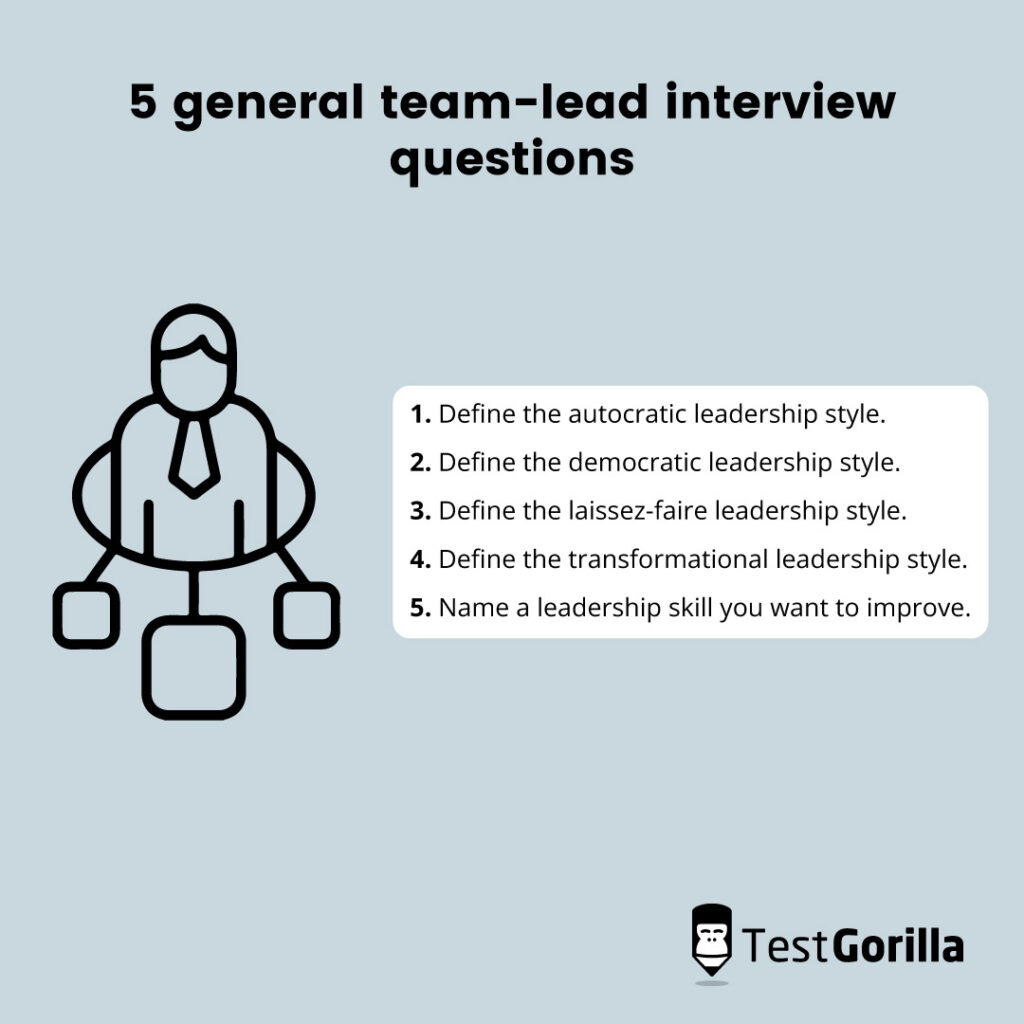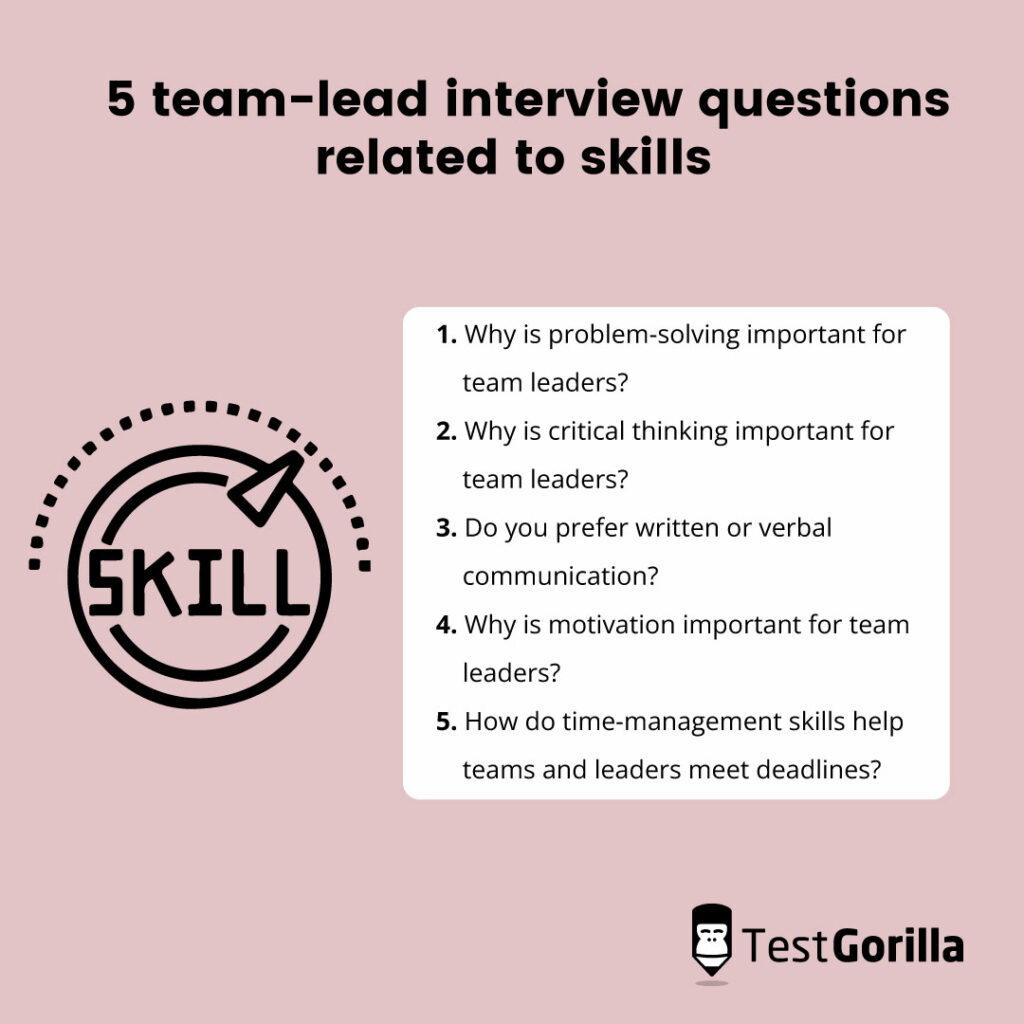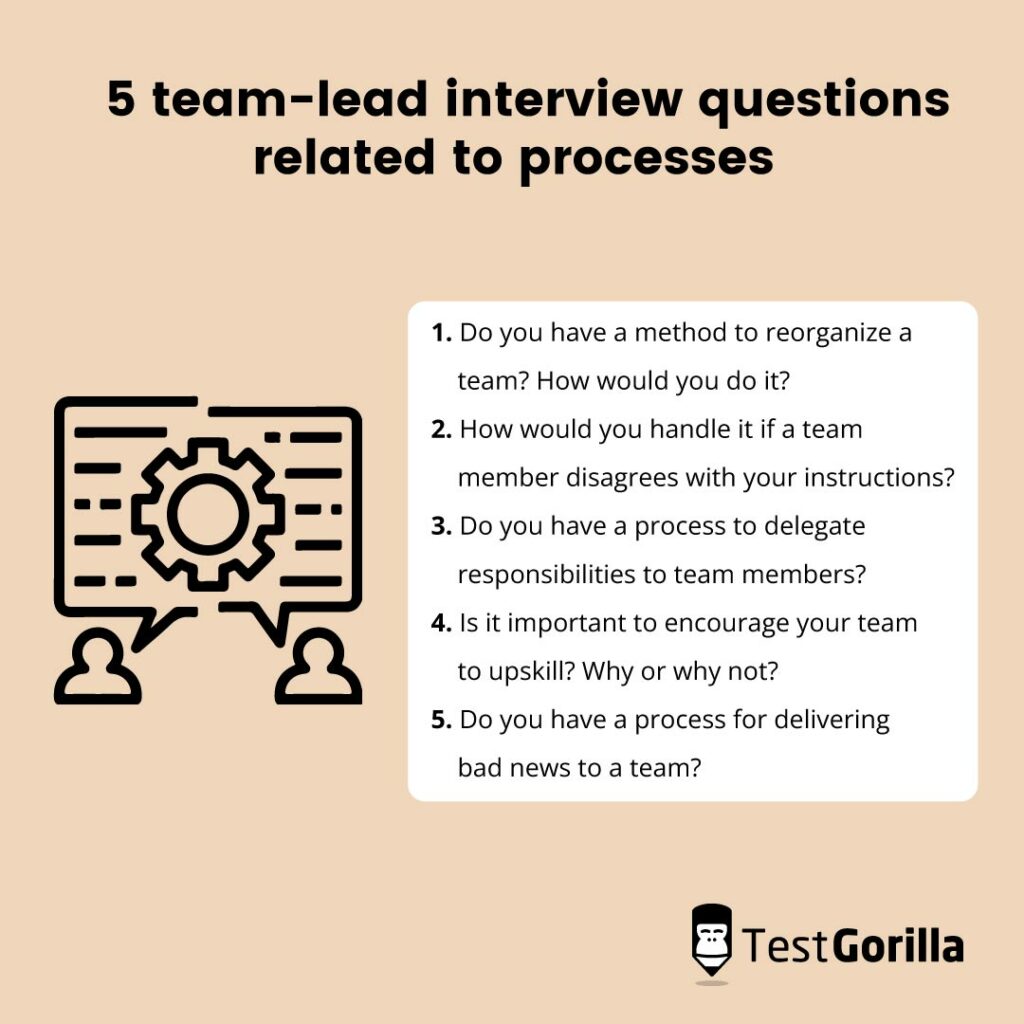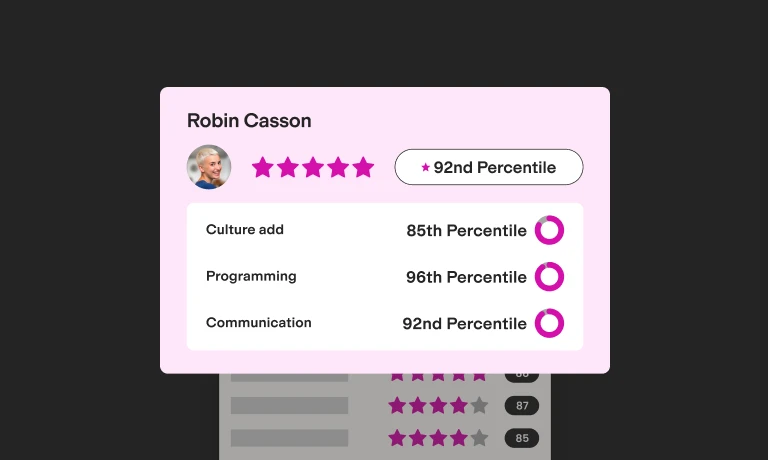50 team-lead interview questions to ask your applicants
Are you looking to hire a new team lead?
Although you may think the process is complex, there’s a simple way to find the right person for the role: Use skill tests to shortlist your most promising applicants and invite them to an interview to see who best meets your criteria.
First, you can create a team-lead skill assessment featuring our Leadership & People Management test to create a shortlist of suitable candidates. Then, you need to ask applicants the right team-lead questions during the interview.
And, if you struggle to find the right interview questions, this article is for you. Below you’ll find a list of 50 team-lead interview questions to ask your applicants, plus sample answers to some of the most important questions to help you evaluate them.
Table of contents
- 22 general team-lead interview questions to ask your candidates
- 5 general team-lead interview questions and sample answers
- 10 team-lead interview questions related to skills
- 5 team-lead interview questions and sample answers related to skills
- 18 team-lead interview questions related to processes
- 5 team-lead interview questions and sample answers related to processes
- When should you use these team-lead interview questions to hire applicants?
- Evaluate professionals with team-lead interview questions and skill assessments
22 general team-lead interview questions to ask your candidates
Ask your applicants some of these 22 general team-lead interview questions to assess their professional experience.
Describe your team-lead experience so far.
Which values are most important to you as a leader?
Have you ever failed as a leader?
How are team leaders different from team managers?
Name your best leadership skill.
Name a leadership skill you want to improve.
Do you consider your leadership more effective in one-on-ones or a group?
How frequently should team leaders meet their whole team?
How would your team describe your leadership style?
What’s the most difficult part of being a team lead?
What do you need to do as a leader to be successful?
When is it important to ask for feedback as a team lead?
Name one decision that is difficult to make as a leader.
How do tools help you complete processes as a team lead?
Why should we consider hiring you to be our next team lead?
Do you have any personality traits that help you manage a team efficiently?
Define the autocratic leadership style.
Define the democratic leadership style.
Define the laissez-faire leadership style.
Define the transformational leadership style.
Describe your coaching experience.
How have you improved your current company’s performance?
5 general team-lead interview questions and sample answers
Here are the sample answers to five of the general team-lead interview questions from the previous section. Use them to check your applicants’ responses and suitability for the role.
1. Define the autocratic leadership style.
Candidates should know the main leadership styles and be able to explain what an autocratic style looks like.
Autocratic team leaders control every decision and expect little input from the team to achieve the required results. Although it has a bad reputation, it’s a good approach in some situations, for example when:
The team’s output needs to be error-free and all team members need to adhere to strict standards
The team needs to deal with a time-sensitive or a crisis situation
Clear and specific direction is needed and there’s very little leeway for interpretation or creativity
Many leaders don’t use just one leadership style, so applicants may explain that they might take a blended autocratic and transformational approach if they lead an inexperienced team.
2. Define the democratic leadership style.
The democratic leadership style is the opposite of autocratic leadership.
Candidates who can explain that democratic leaders enlist team members to help them make decisions are the ones to watch. They can also mention that this leadership style is ideal when each group member has the skills and expertise to contribute to discussions, such as in cross-functional teams.
3. Define the laissez-faire leadership style.
Laissez-faire leadership enables teams to complete actions independently with minimal guidance.
Applicants should know that the laissez-faire leadership style requires team leaders to empower their employees and that it’s most effective if group members are:
Resourceful
Ambitious
Confident in their abilities
4. Define the transformational leadership style.
Team-lead candidates should be familiar with the transformational leadership style, even if it’s not their first choice. If they have done their research, they will know that this style requires leaders to present a global vision to the team.
Transformational leadership is ideal in times of change, especially if employees struggle with adapting to the new circumstances and find their work stressful.
5. Name a leadership skill you want to improve.
Applicants should know why it’s important to constantly improve their leadership skills and be able to provide an example of a skill they want to improve.
For instance, they might want to get better at conflict resolution or situational judgment, which you can evaluate with our situational judgment tests.
The key to evaluating applicants’ responses to this question is to check whether they have a specific plan to improve their skills. For example, they might want to enroll in an online course or might be frequently asking senior management for feedback and advice.
If you know how they plan to improve, you can also support them more efficiently.
The best insights on HR and recruitment, delivered to your inbox.
Biweekly updates. No spam. Unsubscribe any time.
10 team-lead interview questions related to skills
To check if your candidates have the right team-lead skills, ask applicants some of these ten interview questions.
Do you prefer written or verbal communication?
How would your team members rate your leadership skills?
Why is problem-solving important for team leaders?
Why is critical thinking important for team leaders?
How would your team members rate your negotiation skills?
How do you ensure you remain focused during team conversations?
How do time-management skills help teams and leaders meet deadlines?
How do you stay organized as a team leader?
Why is motivation important for team leaders?
How would you rate your task-delegation skills?
5 team-lead interview questions and sample answers related to skills
Use the five sample answers below to check if your applicants have the correct skill set for your company.
1. Why is problem-solving important for team leaders?
Candidates should know that strong problem-solving skills enable leaders to:
Work well with their team
Notice and resolve issues swiftly
Encourage collaboration between team members
Support the team with the right risk-management strategies
Research suggests team leaders need development opportunities to simultaneously maintain professional relationships and solve problems for their teams. Check if your applicants aim to enhance their problem-solving skills by asking them this interview question.
If you need to assess your applicants’ problem-solving abilities, the fastest, most reliable option is to use our Problem Solving test. This test helps you evaluate your applicants’ abilities to:
Create and adjust schedules
Use data to make decisions
Prioritize tasks
Analyze textual information
2. Why is critical thinking important for team leaders?
Since weak critical-thinking skills lead to bad decisions and repeated mistakes, a team leader should hone this skill to avoid these consequences. Critical thinking skills can help team leaders to:
Determine the issues that exist in the business
Be open-minded about different problem-resolution methods
Evaluate their team’s opinions
To evaluate your candidates’ critical thinking skills, add our Critical Thinking skill test to your candidate assessment.
3. Do you prefer written or verbal communication?
A team leader must know when to use written or verbal communication depending on the situation. They should be comfortable using both methods even if they have a preference. Candidates might mention that verbal communication is more efficient because they can interpret their team member’s body language and address concerns more easily.
Always look for candidates with top communication skills, which you can quickly assess with our Communication skill test.
4. Why is motivation important for team leaders?
If a team leader can stay motivated, they will be able to motivate others. If they can also show they value their team members, this can help the entire team feel more engaged: 93% of employees are more motivated if they feel valued.
Highly motivated team leaders are able to:
Encourage employees to develop their skills
Provide employees with positive feedback
Share visions and targets with the team
To ensure your candidates understand the importance of motivation for team leaders and can inspire your team members, use our Motivation test.
5. How do time-management skills help teams and leaders meet deadlines?
Team leaders should understand that good time management is essential for meeting deadlines. This skill helps enhance the business-client relationship with a consistent and reliable product output.
Strong time-management skills enable team leaders to:
Plan projects
Prioritize tasks and delegate them to suitable team members
Monitor their team’s output
If they can use these time-management subskills, they will have no problem meeting deadlines.
Evaluate your future team lead’s time-management abilities with our Time Management test.
18 team-lead interview questions related to processes
Ask interviewees a few of these team-lead interview questions related to processes to learn how they handle challenging situations.
How would you mentor a team member who wants to be a leader?
Which method would you use to lead a team during times of change?
How do you make sure to be a strong role model for your team?
How would you enhance team cohesion in a team that has disagreements?
Do you have any methods to ensure your team accepts your ideas?
Do you have any methods to gain commitment from your team?
Do you have a process to deliver bad news to a team?
What would you do if you received the same criticism twice?
Do you have a method to reorganize a team? How would you do it?
What is your approach to getting support from cross-functional teams?
Do you have a process to delegate responsibilities to team members?
Have you ever had to change a decision or process due to new information?
How do you work in an environment that has fast-paced processes?
Have you ever had to make a decision that your team considered unpopular?
Describe how you would organize projects.
Is it important to encourage your team to upskill? Why or why not?
How should team leaders work with their managers?
How would you handle it if a team member disagrees with your instructions?
5 team-lead interview questions and sample answers related to processes
Check the answers to these five key team-lead interview questions related to processes to evaluate how your interviewees complete difficult tasks.
1. Do you have a method to reorganize a team? How would you do it?
Reorganizing a team is sometimes necessary – this method can ensure teams are more efficient and deliver better work. Team leaders can take the following steps to reorganize a team effectively:
Look at the organization’s goals
Consider each team member’s best skills
Match the team members’ best skills to the new team structure and goals
Make sure team members understand their new tasks and responsibilities
2. How would you handle it if a team member disagrees with your instructions?
Skilled team leaders recognize the importance of listening to team members and learning why they disagree with instructions.
To give a comprehensive answer that shows their expertise, applicants should mention that leaders should:
Explain their directions again
Mention why it’s important to do the task according to their instructions
Listen to feedback
Make adjustments if needed
3. Do you have a process to delegate responsibilities to team members?
A few steps team leaders should use when they delegate responsibilities to team members include to:
Gain information on each team member’s best skills
Provide each team member with tasks that suit their skills
Give team members the tools they need to complete tasks
Monitor the team’s performance
This approach can increase the output of the company by empowering team members and assigning them tasks that match their skills.
With our Project Management and Leadership and People Management tests, you can test your applicants’ abilities to lead projects and teams efficiently.
4. Is it important to encourage your team to upskill? Why or why not?
For teams to improve their output and adjust to changes in their industry, they must be open to upskilling or honing existing skills. The team leader’s role is crucial in enabling team members to learn new skills.
Team leads can achieve this if they:
Provide employees with constructive feedback
Offer coaching and learning opportunities to team members
Provide training to build team members’ skills
Use the team’s collective intelligence to enable mutual upskilling
The best way to review your applicants’ team-upskilling processes is to check if they understand these methods. Can they explain how these approaches help encourage their team? Ask follow-up questions during the interview to find out more.
5. Do you have a process for delivering bad news to a team?
Team leads must have a process when they deliver bad news to a team.
Applicants should know that some key actions they should take to achieve this include to:
Share the news with the whole team
Explain why the news is important
Talk about the steps that can help resolve the issue
Allow team members to discuss the news
Address any concerns they may have
When should you use these team-lead interview questions to hire applicants?
Efficient hiring processes often include skill assessments and interviews, but which should you do first?
The best option is to build a skill assessment first and test all applicants. If you use TestGorilla, you can combine up to five skill tests to identify your most skilled applicants. After that, you simply need to use the team-lead interview questions from this article to assess shortlisted candidates and make a hiring decision.
This method enables you to:
Check all applicants’ skills before you invite them to an interview
Compare individual skills and learn more about them during the interview
Make unbiased hiring decisions
The data-driven process is easier and less time-consuming than screening every applicant’s resume, so remember to use skill assessments before you invite applicants to an interview.
Evaluate professionals with team-lead interview questions and skill assessments
If you combine skill assessments and team-lead interview questions, you will have no problem finding the best team lead for your open position.
Our Leadership and People Management test is ideal for a comprehensive leadership assessment. You can combine it with other skill tests from our test library (such as the ones we mentioned in this article) to build an effective hiring process.
Use TestGorilla to create your skill assessments and hire the perfect match. Sign up for a free demo today and see for yourself how much easier recruitment can be.
You've scrolled this far
Why not try TestGorilla for free, and see what happens when you put skills first.





















